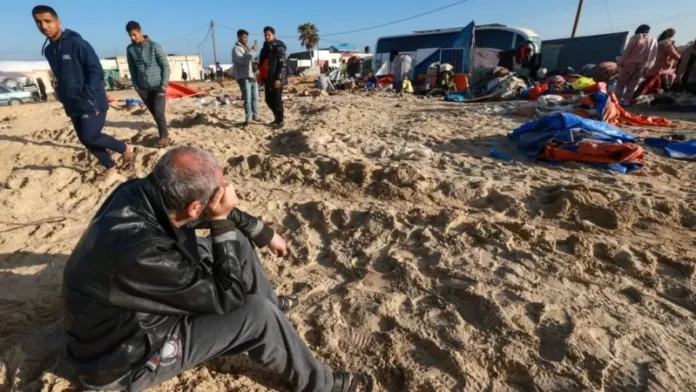The United Nations has once again found itself at the center of the ongoing conflict between Israel and Hamas, as the Israeli military carried out airstrikes in northern and southern Gaza on Wednesday. This comes just a day after the United States vetoed a U.N. Security Council resolution that called for an immediate humanitarian cease-fire, increased aid access, and rejected the forced displacement of Palestinians.
According to reports from the Israel Defense Forces, dozens of militants were killed in the airstrikes, including in the Khan Younis area of the southern part of the Gaza Strip. However, the Hamas-run health ministry in Gaza reported a much higher death toll of 118, bringing the total number of Palestinian deaths to nearly 30,000 since the war began in October.
The U.S. Ambassador to the U.N., Linda Thomas-Greenfield, justified the veto by stating, “Demanding an immediate, unconditional cease-fire without requiring Hamas to release the hostages will not bring about a lasting peace.” She further explained that such a resolution could actually prolong the conflict between Hamas and Israel, extend the hostages’ time in captivity, and worsen the dire humanitarian crisis faced by Palestinians in Gaza.
The Algerian-drafted resolution had been presented to the 15-member Security Council three weeks ago, but its vote was delayed in hopes of ongoing negotiations between the United States, Egypt, Qatar, and Israel to secure the release of all hostages and a pause in the fighting. However, the Algerian Ambassador, Amar Bendjama, stressed that silence is no longer an option and it is time for the council to take action.
Bendjama warned that the council is rapidly approaching a critical juncture where calls for a cease-fire will lose their significance. He also condemned Israel’s impending incursion on the southern city of Rafah, where 1.5 million Palestinians are sheltering, stating that every Palestinian is now a target for death, extermination, and genocide. He questioned how many more innocent lives must be sacrificed before the council deems it necessary to call for a cease-fire.
The Algerian text had strong support from 13 council members, with only the U.S. casting its veto. This is the third time the U.S. has used its veto to block a cease-fire resolution. Palestinian envoy Riyad Mansour expressed his disappointment, stating, “The call for a cease-fire should have been agreed to a long time ago. What fresh hell needs to be crossed for this council to finally demand a cease-fire?”
In contrast, Israel’s Ambassador, Gilad Erdan, called the idea of a cease-fire “absurd” and not a solution to the ongoing conflict. He also questioned why the Security Council is so focused on aiding “these monsters” stay in power, referring to Hamas. Erdan reiterated that Hamas would continue to attack Israel if given the chance.
In response to the veto, the United States has proposed its own resolution, which calls for a temporary cease-fire based on the release of all hostages and the urgent need for a plan to protect civilians in Rafah. The U.S. Ambassador stated that this proposal was a sincere effort to address the concerns of civilians in Gaza and not an attempt to cover for an imminent ground incursion.
The U.S. has assured that it will work with other council members to get the resolution passed. However, Israel has warned of an impending offensive in Rafah, with officials stating the need to target Hamas members in the area. The officials have also mentioned the possibility of evacuations for civilians, but United Nations officials have repeatedly stated that there is no safe place for civilians in Gaza.
The World Food Program has paused deliveries in northern Gaza, where an estimated 300,000 people are still living in dire conditions, including famine. Aid distribution has been hindered by chaotic situations, including looting, violence, and gunfire. Israel launched its military campaign in October to eliminate Hamas after the group’s fighters killed 1,200 people and took around 250 hostages. Hamas, a designated terror group by the U.S., U.K., and EU, is believed to still be holding about 130 hostages in Gaza, with 30 of them likely dead.
In conclusion, the United Nations is facing a difficult situation as it tries to bring about a lasting cease-fire between Israel and Hamas. The U.S. veto may have caused disappointment, but it is crucial for all parties to continue working towards a solution that will protect the lives of innocent civilians and bring

